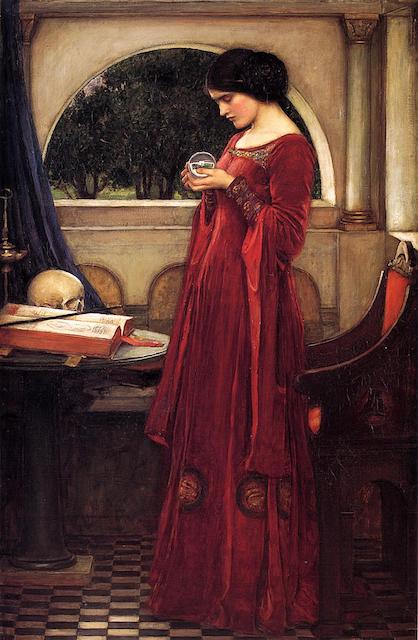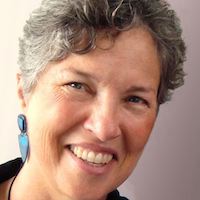
“The important thing is to never to stop asking questions.” ~ Albert Schweitzer
~
When I taught Women’s Studies in the 1970s and 1980s, I would tell my students on the first day that there were no “stupid questions” in my classroom.
If they had a question, probably half the class was wondering the same thing. They would be doing us all a favor if they asked it out loud. But more importantly, I continued, they would be taking control of their own education; they would learn sooner what they needed to know.
Since I began tapping into my inner wisdom by performing divinations, I’ve realized a lot more about questions. Divination employs a variety of methods, but its purpose remains the same: to get in touch with out-of-the-box thinking. It’s a process for answering questions that makes active use of our intuition.
As a result, I’ve learned that questions may be even more important than the answers they prompt. Questions, divinatory questions in particular, can create possibilities, freedom, and choices—especially if I don’t limit the truth I’m willing to hear. And they’re important if I want to receive the guidance I desire from my inner wisdom.
It seems obvious to me that some questions are best answered by research or reading—things that our conscious, analytical mind excels at, not our inner wisdom. If I want to decide which kind of guitar to buy, which school to attend, which expert can give me the information I’m seeking, all of these concrete, factual questions are best answered using a little effort online or in my public library. But for the most important questions in my life, I’m the expert. As Alix Dobkin sang years ago, “The woman in your life/Knows simply what is true…/She knows everything you do/Because the woman in your life is you.”
In my last post on Elephant Journal, I offered an example of how two different questions guided a person’s oracular quest in two contrasting directions (the post also includes step-by-step instructions for performing an oracle for yourself). Because my student was looking for different types of feedback—first, about enjoying her overly busy life, and second, about helping out her nephew—at the same place and at almost the same time, her inner wisdom offered two unique oracular answers.
From cases like this, I’ve learned that divinatory questions need to be extremely specific to the problem in my life that I want guidance about. The inner quest stimulated by one query will vary from the quest that’s inspired by a question that’s only slightly different. So, I make sure that my question is aimed at the kind of information I’m seeking.
For example, am I looking for clues about the outcome of the situation, the relationship(s) involved, my emotional reaction to it, or something else? Based on those factors, I create a particular question to help me understand what has stumped my analytical mind. My inner knowing has far more resources to answer such a question.
As a result, crafting my oracular questions has become a major part of performing an oracle. I’ve discovered that when developing a divination question, it’s important to stay open to possibility. Restricting the range of my request inhibits my inner wisdom. For me, that means it’s best to avoid “who” or “where” questions. They don’t allow my unconscious enough room to play. Plus, the answers to such questions tend to be too specific and provide little insight.
In contrast, “why” questions tend to be too broad and will often provide answers that are too vague, leaving me with little practical guidance. Open-ended questions like these can leave my inner wisdom floundering in the deep, abstract waters of philosophy or metaphysics. That’s why I normally use “what” or “how” questions, which usually give me the information I need.
I’ve found that several phrases can help me elicit my inner knowing. When I’m confused about some undertaking or process that I’m facing, I find that it’s often a good idea to ask “how best” to approach it. In fact, “how best” is often the best kind of question, pun intended. And sometimes, when I have a good idea of the path I want to take or the end I wish to achieve, it makes sense to ask what the “next step” is that I need to take.
Another thing I’ve learned is that we often know what we want to hear from an oracle, and so we fashion a leading question that results in the desired answer. To avoid this common mistake, I have to be careful not to include any assumptions in my question about its answer.
For example, if I ask how I can get rid of a block that’s holding me back, my intuition will duly tell me how to dispose of it. But that assumes that I want to rid myself of this barrier. If I ask—without any expectations—how to deal with the block, the answer might be something else entirely. Relinquishing control in this way can feel scary at first, but by doing so, we gain the precious wisdom available from the mysterious realm of insight within all of us.
Working with people in my divination workshops, I’ve also discovered that sometimes two questions are better than one. For instance, several participants in my classes have faced the choice between two jobs. The first draft of their oracular question was, “Which job should I choose?”
When we looked more carefully at this question, we realized that the two jobs might metaphorically involve apples on the one hand and oranges on the other. As a result, the job seekers were better off asking two questions: What will it be like if I take job #1? and, what will it be like if I take job #2? That way they could look at what their deeper knowing had to say about each opportunity and compare the outcomes.
If you would like feedback on an oracular question, please leave a comment with both the question and some background information about the situation you’re confronting. I’d be happy to work with you on how to fine-tune it.
~
~
~
Author: Nancy Vedder-Shults
Image: Wikipedia
Editor: Travis May
Copy Editor: Lieselle Davidson
Social Editor: Nicole Cameron











Read 0 comments and reply